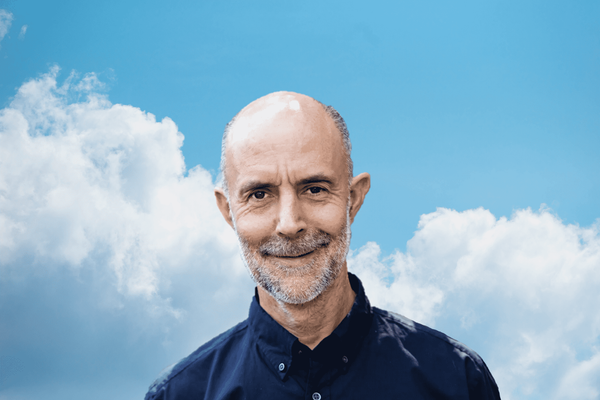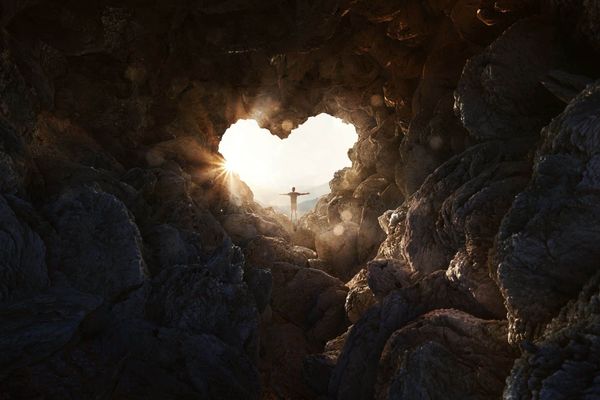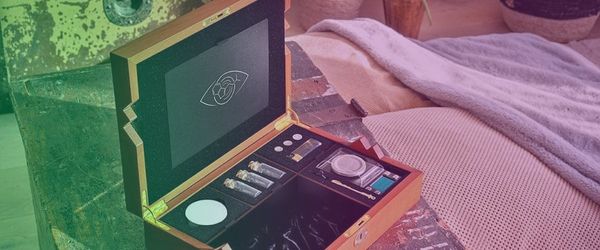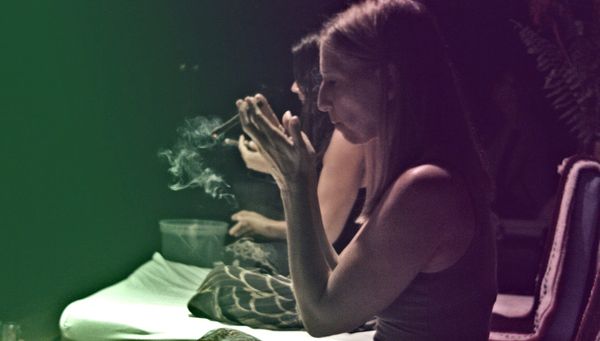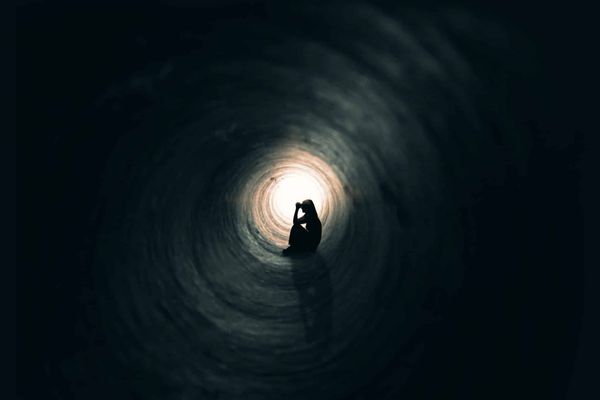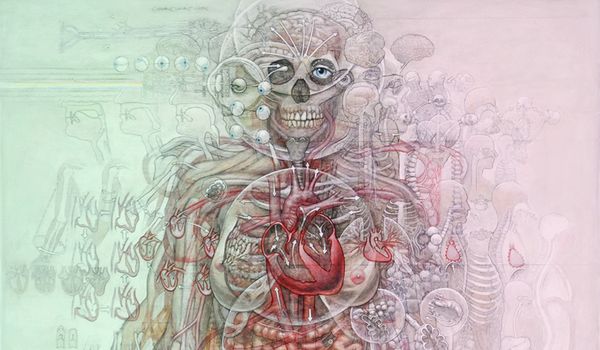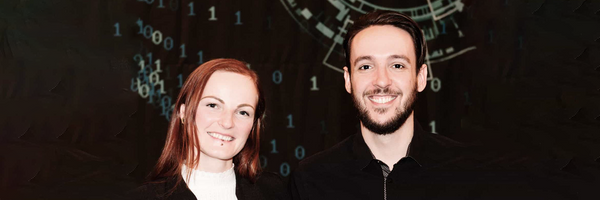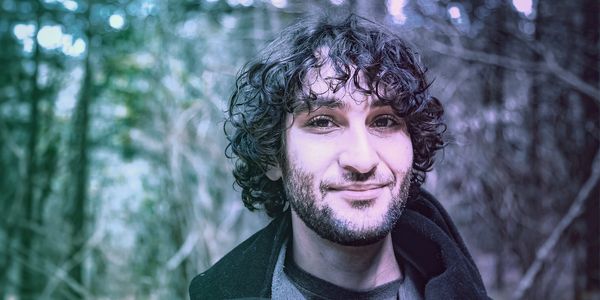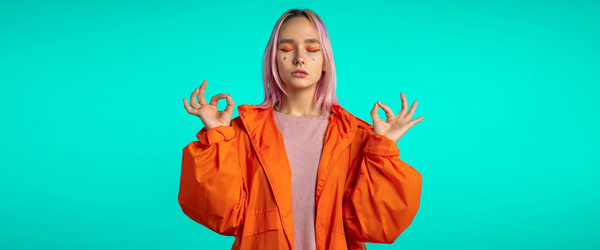Daniel Goldsmith • • 6 min read
1 Simple Question You Have to Ask Yourself to Attain Self-Realization
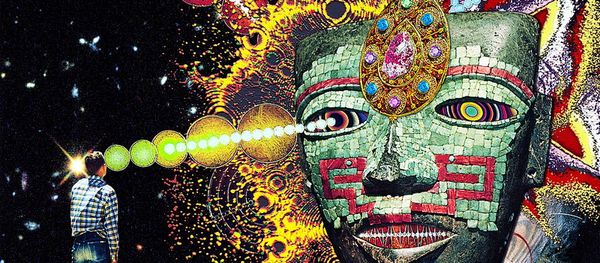
In the early 20th century, an enlightened Indian sage named Ramana Maharshi lived at the base of a mountain thought to be the incarnation of Lord Shiva himself.
Ramana’s radiance attracted many disciples, including westerners like Sumerset Maugham. When his disciples asked how to attain Self-realization, Ramana directed them to meditate on a single question:
Who am I?
Follow the maxim to “Know Yourself,” he said, and it will lead to enlightenment.
I’ve spent years pondering this question. At first, I entertained the hope that the “big reward” was waiting for me after just a few more hours of meditation. The deeper I pursued it, however, the more I realized that I could not really say who I was. I couldn’t find any solid, unshakable core of “I-ness,” since everything I thought was ‘me,’ from habits to memories to my body, changes over time.
It took me awhile to realize that being stuck was not a sign of failure. Quite the contrary: finding something definitive to hold on to would have indicated that my analysis hadn’t been exhaustive. Had I thought, “I’ve done it, I’ve found my self,” Ramana might have asked, who exactly is this self who knows? Ramana’s method is a process of negation after negation, cutting through everything you think you know about who you are.
In a similar vein, Zen instructs us, “Do not seek enlightenment, just stop cherishing illusions.”
That’s it. See reality for what it is instead of what you think it is. The trouble is that we often don’t even realize our illusions as illusions. Nowhere is this truer than with the thought that ‘I’ is a solid, substantial, independent entity. I’ve seen first hand how failing to question this presupposition leads to suffering.
Meditation: What’s the first thing that comes to your mind when someone asks you who you are?
I’ve struggled my whole life with what seemed to be an important aspect of identity: nationality.
I can’t really explain it, but I sensed from a very young age that there was something fundamentally rotten with the American way of life.
Even though everyone around me seemed to think it was the best thing in the world, I never felt I could really take pride in having been born in this particular place. As a teenager, I constantly fantasized about other identities that could never fully be mine. I sported Che Guevara t-shirts and went to learn French in Paris, where I would always introduce myself as Americain and quickly follow that with malheureusement. Whatever it meant to be American, I knew I wasn’t that. I took pride in being ashamed of my unchosen collective identity.
At the age of 18, I quickly ran to the place I felt was most opposite my hometown. Colorado Springs was hyper religious, ultra-conservative, and xenophobic, but Montreal was a haven of multicultural, liberal permissiveness.
When I traveled to Europe after my first year of university, I unabashedly introduced myself as ‘from Montreal.’ When people would ask, ‘aren’t you just going to school there?’ I would respond that it’s much more than that. I had cast off the old label and adopted a new one that I felt better reflected my values, closer to the essence of who I really was.
But the folly of thinking I could just swap ‘American’ for ‘Quebecer’ came crashing down at 4AM one St Jean Baptiste day (Quebec’s national holiday). In a smoky tavern in Old Quebec City, I stumbled upon a blues quartet whose music regaled me for hours. At the end of the night, when I tried to convey my delight to a group of country Quebecers, they ruthlessly mocked my spirited attempt to make conversation with them in their own language. Their message was clear: just because you’ve been here for a few years and can speak the language doesn’t entitle you to think you now belong to our group.
Even though I knew those guys were a bunch of country-bumpkins coming to the ‘big city’ for their once a year party, I took this quite personally. I began to wonder how many other Quebecers (both French and English) with whom I thought I had connected were thinking the same things in the back of their minds.
My project of swapping one national identity for another was seriously thrown into doubt. I knew deep down that I was truly a ‘world citizen,’ but for some reason, that didn’t really satisfy my longing to belong to the ‘right’ group. Why had I invested so much importance in being associated with other people I didn’t even know in the first place? Did it really make that much difference in my day-to-day life?
I slowly began to see that being American or Canadian or Quebecois was just an idea. Nations only exist in human minds, something that should have been clear to me looking down from airplanes on a borderless earth.
I began to wonder if national identity was just an attempt to satisfy the primal need to belong to a tribe, which had become more important in an industrial age when we live in enormous ‘hives’ with millions of people we could never personally know. When we identify as part of a nation, it makes us feel connected through time and space to others who are part of this extended family. But what basis do we really have for asserting continuity within a group of millions living across an entire continent over centuries?
None of us are born knowing who is part of ‘us’ and ‘them.’ Nobody is born knowing how to react to previous injustices that have been inflicted upon ‘our’ group. Pride, hatred, and all the other emotions that stem from national belonging are acquired over time from parents, history books, and patriotic festivals.
Meditation: What other types of ideas do we acquire about our identity as we grow up?
A solution to my national identity problem now became clear: just stop caring. I had invested this abstract idea called ‘nationality’ with such power that I didn’t even realize that all I had to do to be free of its grip was see that it was just an idea. Because I believed that Americanness was truly real, I had spent years of angry struggle trying to de-tar myself from this association, when all I needed to see was how attached I had become (even in my opposition) to a label that had been imposed on me from outside and could never fully capture the essence of all the ‘I’s’ that composed the ‘we.’
It’s not that nationality isn’t real. It’s just not ultimately real. I overlooked the fact that it’s a convention that facilitates relations between us, in the same way I often lose sight that money is only paper and metal we’ve endowed with value.
Nationality is a sticker that, in some ways, diverts us from examining the vast and unspeakable mystery that underlies our existence. Perhaps because we find it so uncomfortable to realize just how much we don’t know about ourselves, we reach out for certainty in knowing ‘I am American’ (or, in my case, in knowing that I am not that). While I couldn’t possibly explain how my body spontaneously appeared all of a sudden, billions of years into the universe’s existence, at least I know for sure that I’m an American and everything that entails.
If I ever traveled to a different country without my passport, however, I’d find out pretty quick that custom’s officials don’t care if I define myself as a collection of atoms that has been swirling around in one form or another since the Big Bang and have now managed, quite apart from my personal will, to arrange themselves in such a way as to be aware of their arrangement. Even if that is a much more accurate description of who I am, they just want to know what ‘team’ of humans I belong to, and whether this team constitutes a possible threat to their own.
Likewise, if I got stopped for speeding, it probably wouldn’t be wise to mention that I am a being who was mysteriously thrown into existence one day, who has no fixed essence and is constantly free to recreate and reinvent myself. Police officers would likely be uninterested in hearing how the basic fact of our existence as human beings is unspeakably beautiful.
Meditation: How do you feel about the ‘team’ of humans you belong to?
So then, who am I?
If I am not my, nationality, body, or thoughts, then what remains?
Ramana’s question is meant to take you out of what you think you know, and bring you face to face with the vast incomprehensibility lurking within each moment, in every cell. Through poetry, meditation, and the enlightened gaze of people like Ramana, we sense this inexpressible reality at the core of our being. This thunderous silence is not an object, but rather the infinitely profound and utterly obvious awareness out of which all thoughts arise and into which they dissolve.
It might not be very satisfying to say that this truth is inexpressible, especially for the western mind. But there are so many essential experiences in our lives (love, intuition, friendship, etc.) that words could never fully describe. Many times, the harder we try to grasp these things, the more we push them away.
Perhaps the most we can do is resist attaching to easy answers and simply become aware and fully embody the mystery that we are. As the Buddhist teacher Chogyam Trungpa put it,
“If you ask, ‘who am I?’ – [and] don’t regard it as a question but as a statement, then that question is the answer.”
Photo by Eugenia Loli.

